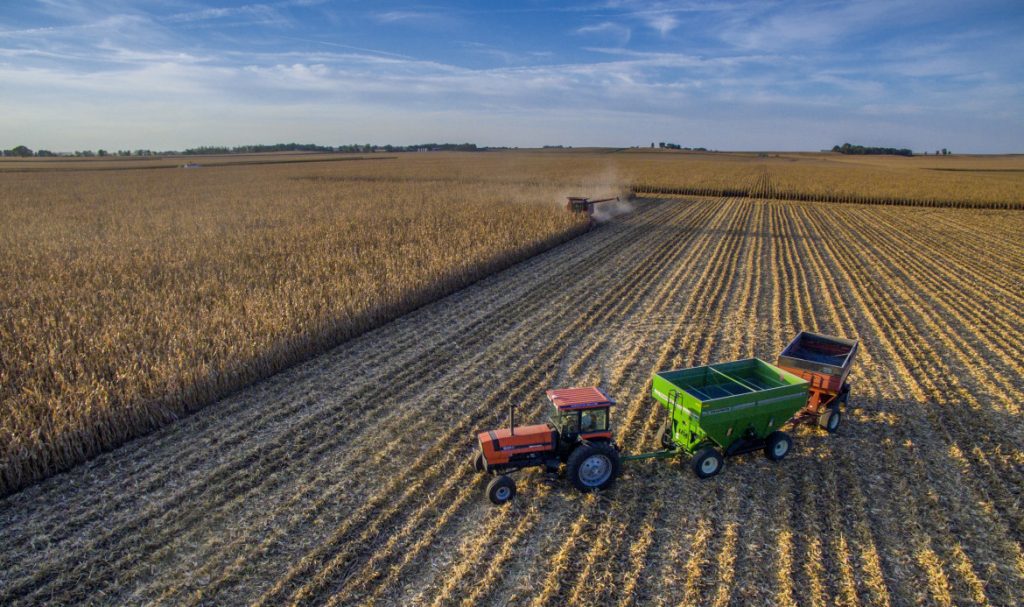WASHINGTON—The Trump administration is seeking to blunt domestic opposition to its trade policies with a relief package for farmers affected by the U.S. trade spat with China, say officials involved in the discussions.
[Bob Davis, Siobhan Hughes and Jesse Newman | April 12, 2018 | WSJ]
The aid package, which could climb into the billions of dollars, is still being developed. Agriculture and congressional officials are examining Depression-era programs like the Commodity Credit Corp., which was created in 1933 to stabilize farm incomes, and which permits borrowing of as much as $30 billion from the Treasury to finance its activities. Using the CCC would also give the administration an existing program to tap, rather than having to devise something new that would need to clear Congress.
These programs haven’t traditionally been used in trade fights, but Congress has started to clear the way for the CCC to be tapped.
Last month, lawmakers lifted restrictions that, until now, stood in the way of the Agriculture Department using a special price-support program to aid farmers. The change, tucked into a sweeping, $1.3 trillion spending bill, reversed years of restrictions that had prevented the CCC from supporting farm prices or buying surplus products.
Sen. Chuck Grassley (R., Iowa) said that the Trump administration could rely on the CCC and related authorities to shield farmers from the effects of any tariffs imposed by China. “I’ve had a conversations with people in the administration that thought if there were ever tariffs imposed, that the income coming from the tariffs could be used for that purpose,” Mr. Grassley said on Tuesday.
Farmers are on the front lines of the U.S.-China trade fight. China is targeting U.S. agricultural products for tariffs in retaliation for U.S. levies on Chinese goods because Beijing realizes that the Farm Belt was crucial to President Donald Trump’s electoral victory. Mr. Trump said on Monday that farmers may initially take a financial hit from tariffs, but “we’ll make it up to them.”
By putting together a farm-relief program, the administration hopes that will make it less likely China will focus as heavily on farmers. That is because Beijing would know the farmers have an income stream even if they are hit by levies in retaliation for U.S. tariffs.
Many farm groups say they aren’t looking for a handout and would rather have unimpeded trade with China. “Farmers are more interested in negotiation [with China] than mitigation,” said Davie Stephens, vice president of the American Soybean Association and a farmer who raises crops near Clinton, Ky. “Let’s get an agreement where tariffs don’t have to be implemented.”
Soybeans are one of the U.S. exports likely to face Chinese tariffs if the current trade tensions unfold as many people fear.
Some Republicans are amplifying those concerns. “This administration proposal is Saturday-morning-cartoon central planning,” Sen. Ben Sasse (R., Neb.) said in response to the news that the Trump administration was examining the use of the CCC. “We want more trade, not less. Farmers want to feed the world and win with trade. Now, some in Washington instead want to pay them to lose. That’s a bad idea and not a real strategy to fight Chinese cheating.”
A coalition of about 45 trade associations, representing industries from high technology to shoes—and all of which oppose tariffs on China—are focusing their lobbying efforts on agriculture in pitches to Capitol Hill and the White House, said those involved in the lobbying. “Farmers are seen as the one group able to change the president’s mind,” said a lobbyist involved in the effort.
Farmers for Free Trade, a trade group supported by the American Farm Bureau Federation, as well as by pork, wheat and corn producers, said it has so far spent $650,000 on an anti-tariff television ad, featuring a soybean farmer. The ad is airing in markets surrounding Washington, D.C., and Mar-a-Lago, Fla., Mr. Trump’s weekend retreat.
China retaliated against U.S. steel and aluminum tariffs by imposing tariffs ranging from 15% to 25% on U.S. pork, fruits, wine and nuts. Beijing then threatened 25% tariffs on U.S. soybeans shortly after the U.S. targeted a passel of Chinese goods for alleged violation of U.S. intellectual property laws.
Prices for soybeans tumbled last week after China’s threats, though the market has since rebounded, thanks to poor U.S. weather and signs a U.S.-China trade war could still be avoided. Hog prices fell more than 5% in early April when China said it would start levying planned tariffs on U.S. pork.
The volatility in prices—as well as shifting opinions over whether a full-scale trade war will break out—pose many unanswered questions that make it difficult to devise a compensation plan, said, Darci Vetter, a former agriculture trade official in Obama and Bush administrations.
“Who would be considered harmed and eligible? How would you structure a payment to them? How would you deliver it across the country?” she asked.
Working out the details could take months, she said, extending uncertainty through the fall season when farmers typically purchase seed and other crop supplies for the coming year.
An Agriculture Department spokesman said that “it wouldn’t be prudent to give away our playbook and let China know exactly how we would plan to mitigate what they have threatened.” The spokesman said, “We will not allow our agricultural producers to bear the brunt of China’s retaliation.”













